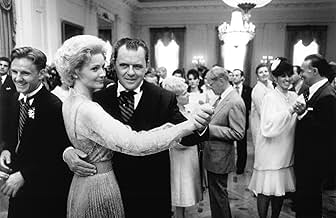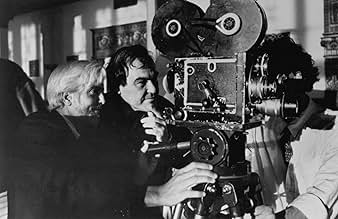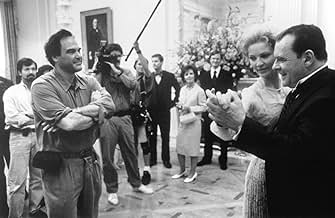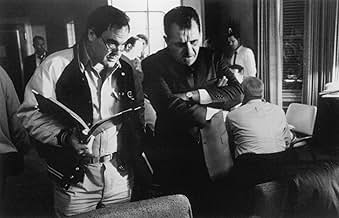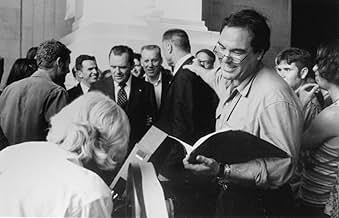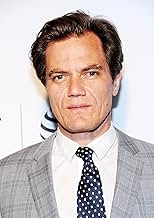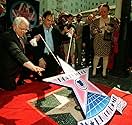A biographical story of former U.S. President Richard Nixon, from his days as a young boy, to his eventual Presidency, which ended in shame.A biographical story of former U.S. President Richard Nixon, from his days as a young boy, to his eventual Presidency, which ended in shame.A biographical story of former U.S. President Richard Nixon, from his days as a young boy, to his eventual Presidency, which ended in shame.
- Director
- Writers
- Stars
- Nominated for 4 Oscars
- 11 wins & 18 nominations total
- Director
- Writers
- All cast & crew
- Production, box office & more at IMDbPro
Featured reviews
Richard Nixon is one of the most controversial heads of state of the twentieth century. During his tenure as president of the United States, he earned a general hatred almost as high as the power and influence of his office. He was investigated, vilified, attacked but never condemned. Even though I'm not an American nor an expert of these period, I feel it is necessary to make an unbiased and objective historical analysis of this president, I just don't know if that has already happened. Even so, the film we have here didn't seem partial, trying to remain neutral to some extent.
Directed by Oliver Stone, it's not appropriate for people who don't know anything about Nixon, or Watergate, or this period of American history, since the film wasn't wasting time explaining anything. So if you didn't understand why Nixon opened the US to China or what was the Watergate or the Bay of Pigs, I suggest you ignore the movie for now and first go read some books or see some documentaries about it. Another problem I want to highlight is the huge web of conspiracies and obscure theories that the film weaves around the president. It never lets us understand what "crimes of responsibility" Nixon has committed. The film also suggests, without subtleties, that Nixon was a simple man who rose in life but wasn't accepted by the "American aristocracy" because of this humble origin, which left him deeply hurt. I don't know if it's true, but the film indicates that as origin of President's lack of scruples.
Anthony Hopkins assures the main role in an interesting performance, but that's far from being his best. He made a good preparation and tried his best to be Nixon, but has few physical similarities with him, not to mention his extreme difficulty in imitating president's characteristic voice. Anyway, Hopkins was brilliant at his character's psychological work, with most dramatic scenes going on as he, semi-drunk, reviews his decisions while listening to his famous audio tapes. The remaining cast does a reasonable supporting work. I will not close my review without left a word of appreciation to the sets and costumes, which rebuilt the atmosphere and culture of the Seventies quite well, much like the rooms and offices within White House. Not being exceptional, it's an elegant, quality film, that helps us think about an important period in American history.
Directed by Oliver Stone, it's not appropriate for people who don't know anything about Nixon, or Watergate, or this period of American history, since the film wasn't wasting time explaining anything. So if you didn't understand why Nixon opened the US to China or what was the Watergate or the Bay of Pigs, I suggest you ignore the movie for now and first go read some books or see some documentaries about it. Another problem I want to highlight is the huge web of conspiracies and obscure theories that the film weaves around the president. It never lets us understand what "crimes of responsibility" Nixon has committed. The film also suggests, without subtleties, that Nixon was a simple man who rose in life but wasn't accepted by the "American aristocracy" because of this humble origin, which left him deeply hurt. I don't know if it's true, but the film indicates that as origin of President's lack of scruples.
Anthony Hopkins assures the main role in an interesting performance, but that's far from being his best. He made a good preparation and tried his best to be Nixon, but has few physical similarities with him, not to mention his extreme difficulty in imitating president's characteristic voice. Anyway, Hopkins was brilliant at his character's psychological work, with most dramatic scenes going on as he, semi-drunk, reviews his decisions while listening to his famous audio tapes. The remaining cast does a reasonable supporting work. I will not close my review without left a word of appreciation to the sets and costumes, which rebuilt the atmosphere and culture of the Seventies quite well, much like the rooms and offices within White House. Not being exceptional, it's an elegant, quality film, that helps us think about an important period in American history.
I will start by saying I am an Oliver Stone fan. For some particular reason though I did not expect to like this movie but obviously I did. He actually unexpectedly gave a very fair depiction of Nixon. Nixon really transformed before my eyes in here. That was really something special to see.
The acting was quite good. Anthony Hopkins though totally uplifted this movie. I could imagine many people saying his performance was over-the-top or a bit too surreal at times. Yet that is what really made his performance so amazing. The way he was able to transform the many crazy and totally off the wall aspects of Nixon and make them into a reality. To me as the movie went on I felt I was in some way able to see his paranoia, anxiety, thirst for power and just the simple fact of wanting to be liked. I could see he was more of a troubled and vulnerable man than a monster. He never quite connected with anybody which made him bitter and fueled his paranoia and greed even more. To me Hopkins portrayed this all perfectly, all the complexities and inner feelings of Nixon. Hopkins slipped into this role in way that you rarely see. He became Nixon, and at times I was speechless or should I say thoughtless watching him portray such an important figure in such a way. More and more I felt sorry for Nixon, as he looked more and more like a schizophrenic. To me this role was more psychologically bone-chilling than his role as Hannibal Lechter in Silence of the Lambs and I have no problem debating that.
The rest of the cast was quite good as well. Joan Allen was very good in showing the complex relationship/marriage she had with Richard Nixon. James Woods freaked me out at times displaying that pure evil and hatred at times that Hopkins showed as Nixon. Paul Sorvino was very good as Henry Kissinger. Mary Steenburgen was interesting to watch in the very limited time she played in here. The two actors though other than Hopkins though that really stood out to me were Bob Hoskins and Sam Waterston. Despite Hoskins not giving an amazing performance and having very limited time he gave me chills just seeing J. Edgar Hoover being portrayed in some sort of way. Sam Waterston despite being limited to really just one scene was even more chilling than the rest of the cast(excluding Hopkins) combined in that one moment. That moment was one of the most intense face to face scenes that I have ever seen. It was so memorable.
The directing was very good. It was not the best I have seen from Oliver Stone but it was up there. For the first 45 minutes or so I was a bit confused about what was happening and the flow of the movie but I got used to it. The first portion of the movie did feel unbalanced at times but the feel of the movie got better as it wore on. Going back to that one scene between Sam Waterston and Anthony Hopkins, I felt this scene was one of the best directed and written scenes I have seen from Oliver Stone or anyone ever. That scene was a microcosm of the movie. The motion-sickness, mind scrambling, paranoid feeling of that scene captured the entire movie. The feeling of even seeing the president himself being treated like a puppet, despite not that shocking, was mind numbing to watch. That scene was true testament to the writing and directing abilities of Oliver Stone.
The writing was also very good throughout. It seemed as if everything Stone wanted to get across got across. The writing was not amazing but it certainly served it duty. The cinematography was great though. Stone always knows how to get his point across in the way he photographs a movie even if all of other aspects of the movie fail. That dark Oliver Stonish feeling kept on creeping in on every scene, but also that dark psychological feeling that he had put in Born On the Fourth of July and Platoon also was felt through the cinematography. The music by John Williams, who always knows how to capture a moment musically, was simply perfect in here again.
I can understand this movie being boring to a lot of people or it being considered propaganda. Yet I think this movie is an overlooked masterpiece. Just seeing Anthony Hopkins perform as Nixon is a good enough reason to see this movie. He took control of this movie by force and took it to another level. Despite this being an Oliver Stone movie it is more fair than you would think. Of course this movie may have a few conspiracy theories included in it but Oliver Stone never forces his theories on people. There is a reason why at the beginning at every movie he puts a disclaimer saying that not everything in his movies are facts. Despite it being great I don't know if this is a movie for everyone. This movie seems to be crazy and surreal but isn't that how life seems to be at times as well?
The acting was quite good. Anthony Hopkins though totally uplifted this movie. I could imagine many people saying his performance was over-the-top or a bit too surreal at times. Yet that is what really made his performance so amazing. The way he was able to transform the many crazy and totally off the wall aspects of Nixon and make them into a reality. To me as the movie went on I felt I was in some way able to see his paranoia, anxiety, thirst for power and just the simple fact of wanting to be liked. I could see he was more of a troubled and vulnerable man than a monster. He never quite connected with anybody which made him bitter and fueled his paranoia and greed even more. To me Hopkins portrayed this all perfectly, all the complexities and inner feelings of Nixon. Hopkins slipped into this role in way that you rarely see. He became Nixon, and at times I was speechless or should I say thoughtless watching him portray such an important figure in such a way. More and more I felt sorry for Nixon, as he looked more and more like a schizophrenic. To me this role was more psychologically bone-chilling than his role as Hannibal Lechter in Silence of the Lambs and I have no problem debating that.
The rest of the cast was quite good as well. Joan Allen was very good in showing the complex relationship/marriage she had with Richard Nixon. James Woods freaked me out at times displaying that pure evil and hatred at times that Hopkins showed as Nixon. Paul Sorvino was very good as Henry Kissinger. Mary Steenburgen was interesting to watch in the very limited time she played in here. The two actors though other than Hopkins though that really stood out to me were Bob Hoskins and Sam Waterston. Despite Hoskins not giving an amazing performance and having very limited time he gave me chills just seeing J. Edgar Hoover being portrayed in some sort of way. Sam Waterston despite being limited to really just one scene was even more chilling than the rest of the cast(excluding Hopkins) combined in that one moment. That moment was one of the most intense face to face scenes that I have ever seen. It was so memorable.
The directing was very good. It was not the best I have seen from Oliver Stone but it was up there. For the first 45 minutes or so I was a bit confused about what was happening and the flow of the movie but I got used to it. The first portion of the movie did feel unbalanced at times but the feel of the movie got better as it wore on. Going back to that one scene between Sam Waterston and Anthony Hopkins, I felt this scene was one of the best directed and written scenes I have seen from Oliver Stone or anyone ever. That scene was a microcosm of the movie. The motion-sickness, mind scrambling, paranoid feeling of that scene captured the entire movie. The feeling of even seeing the president himself being treated like a puppet, despite not that shocking, was mind numbing to watch. That scene was true testament to the writing and directing abilities of Oliver Stone.
The writing was also very good throughout. It seemed as if everything Stone wanted to get across got across. The writing was not amazing but it certainly served it duty. The cinematography was great though. Stone always knows how to get his point across in the way he photographs a movie even if all of other aspects of the movie fail. That dark Oliver Stonish feeling kept on creeping in on every scene, but also that dark psychological feeling that he had put in Born On the Fourth of July and Platoon also was felt through the cinematography. The music by John Williams, who always knows how to capture a moment musically, was simply perfect in here again.
I can understand this movie being boring to a lot of people or it being considered propaganda. Yet I think this movie is an overlooked masterpiece. Just seeing Anthony Hopkins perform as Nixon is a good enough reason to see this movie. He took control of this movie by force and took it to another level. Despite this being an Oliver Stone movie it is more fair than you would think. Of course this movie may have a few conspiracy theories included in it but Oliver Stone never forces his theories on people. There is a reason why at the beginning at every movie he puts a disclaimer saying that not everything in his movies are facts. Despite it being great I don't know if this is a movie for everyone. This movie seems to be crazy and surreal but isn't that how life seems to be at times as well?
Hopkins is remarkable as Nixon. Wisely not even trying for an exact likeness, his interpretation of that so-familiar physicality is uncannily evocative. From the very start, the characterisation is spot-on - the jut of the lower jaw, the growly voice, the rounded shoulders. Once the viewer has adjusted to the initial shock, Hopkins IS Nixon. It ceases to be an issue.
Theodore Roosevelt, Washington, Kennedy and (most of all) Lincoln look down from the White House walls at Nixon, their solemn portraits hovering like admonishing ghosts over the Watergate squalor. In life, Roosevelt was bold and self-assured, whereas Nixon dithers: Washington's self-effacing propriety confronts a Nixon who is suggesting that the Nazis were right. Kennedy is everything that Nixon could never be - above all else, at ease with himself. Lincoln looks down, from the office wall and from his marble seat in the Memorial, in silent rebuke as his successor debases the presidency.
Some of the camera tricks don't work. We see Nixon rooted to the spot at Love Field as the camera soars up and away from him. Why? Obtrusive camera movement is justified only if it adds to our understanding of character or plot. This shot seems to have been included merely for its cleverness. The same is true of the little flashes of black-and-white which keep interrupting the action. At one point, in a dialogue between Nixon and Haldeman, the focus is un-subtly and repeatedly thrown from one man to the other. What does this achieve? Is some artistic goal being pursued, or are the effects included for their own sake? What is the symbolic importance (if any) of the vanishing racehorses?
Much of the attention to detail is of a very high order. Stone's writing team has done its homework, and we get authentic touches such as Nixon's love of log fires, which meant having to run the White House air conditioning system at full blast during summer. The reconstructions of the White House interiors are superb. We see Nixon and Pat engaging in a domestic scrap beneath murals of more edifying battles like Yorktown and Saratoga. Historical events, recorded on news film at the time, are brilliantly reconstituted, replacing the real Nixon with the Hopkins version. Thus we get convincing reconstructions of the Kennedy TV debate and the 1962 'retirement' speech. Young Nixon's courtship of Pat is narrated without dialogue as a grainy, jumpy home movie - and is beautifully done. I did not feel quite so positive about the Alger Hiss segment. Welles did this 'newsreel flashback' idea in "Citizen Kane" more than half a century earlier, and did it with such flair that anything which follows is sure to look jaded. It also seemed to me that this passage is badly-placed, coming immediately after the 1962 California defeat.
James Wood plays Bob Haldeman, and does his usual admirable, photogenic best. My quibble with the characterisation is, this isn't THE Haldeman. The historical personage was grimmer, more stately, more formidable (Fred Emery's "Watergate" bears this out). Wood is restricted here to the role of an aide, rather than the Chief of the White House Staff, an emperor within his own (not inconsiderable) domain.
Pat Nixon does not ring true either, but for different reasons. Joan Allen is more than competent as the steely, astute power behind the Nixon throne. The fault is in the characterisation rather than the actor. The real Pat was (so far as one can judge) an altogether less articulate, less philosophical, less knowing individual. Watch her in the REAL "Checkers" broadcast - she is a stiff, repressed, passive woman, a true 1950's Republican wife, not the power broker that this film would have us believe. It is hard to accept, for example, that Nixon's decision to retire in 1962 was his wife's diktat.
There are elements of this otherwise excellent film which simply don't work. Would the President of the United States REALLY be pulled out of a face-to-face meeting with Brezhnev to deal with some Watergate minutiae? The real-life Mitchell said that he tolerated Martha's indiscretions "because I love her". This touching declaration is cheapened in the film, for no good reason. Similarly, Tricia Nixon's exchange with her father was, in real life, an assertion of unconditional loyalty which was both moving and very much to Nixon's credit. The film version has her asking sceptically, "Did you cover up?" This is quite wrong. The Nixon women would have considered it treachery even to frame such a question.
John Williams' epic score is in keeping with the classical tragedy acted out before us. Nixon's tearful prayer with Kissinger and the farewell speech to the White House staff are scenes of extraordinary power.
Paul Sorvino gives us a marvellous Kissinger, though in my humble opinion Stone goes too far when he makes Kissinger the White House 'leaker' and accuses the Secretary of State of complicity in the Watergate break-ins.
One scene which works splendidly is the (true) incident at the Lincoln Memorial. Nixon tries to glad-hand the indignant youngsters, using the hearty, patronising approach of a bygone generation. The sad revulsion of the protesters shows the gulf between Nixon's consciousness and the spirit of the age.
"I hope I haven't let you down" is uttered one single time by Nixon, towards the end of the film. The truth is, he hit on this formula of words and used it again and again during the final days of his presidency. It was a last desperate attempt to tweak our sympathy-nodes. As such, it was utterly gauche, utterly craven, utterly guileful, yet utterly unrealistic. In fact, utterly Nixon.
Theodore Roosevelt, Washington, Kennedy and (most of all) Lincoln look down from the White House walls at Nixon, their solemn portraits hovering like admonishing ghosts over the Watergate squalor. In life, Roosevelt was bold and self-assured, whereas Nixon dithers: Washington's self-effacing propriety confronts a Nixon who is suggesting that the Nazis were right. Kennedy is everything that Nixon could never be - above all else, at ease with himself. Lincoln looks down, from the office wall and from his marble seat in the Memorial, in silent rebuke as his successor debases the presidency.
Some of the camera tricks don't work. We see Nixon rooted to the spot at Love Field as the camera soars up and away from him. Why? Obtrusive camera movement is justified only if it adds to our understanding of character or plot. This shot seems to have been included merely for its cleverness. The same is true of the little flashes of black-and-white which keep interrupting the action. At one point, in a dialogue between Nixon and Haldeman, the focus is un-subtly and repeatedly thrown from one man to the other. What does this achieve? Is some artistic goal being pursued, or are the effects included for their own sake? What is the symbolic importance (if any) of the vanishing racehorses?
Much of the attention to detail is of a very high order. Stone's writing team has done its homework, and we get authentic touches such as Nixon's love of log fires, which meant having to run the White House air conditioning system at full blast during summer. The reconstructions of the White House interiors are superb. We see Nixon and Pat engaging in a domestic scrap beneath murals of more edifying battles like Yorktown and Saratoga. Historical events, recorded on news film at the time, are brilliantly reconstituted, replacing the real Nixon with the Hopkins version. Thus we get convincing reconstructions of the Kennedy TV debate and the 1962 'retirement' speech. Young Nixon's courtship of Pat is narrated without dialogue as a grainy, jumpy home movie - and is beautifully done. I did not feel quite so positive about the Alger Hiss segment. Welles did this 'newsreel flashback' idea in "Citizen Kane" more than half a century earlier, and did it with such flair that anything which follows is sure to look jaded. It also seemed to me that this passage is badly-placed, coming immediately after the 1962 California defeat.
James Wood plays Bob Haldeman, and does his usual admirable, photogenic best. My quibble with the characterisation is, this isn't THE Haldeman. The historical personage was grimmer, more stately, more formidable (Fred Emery's "Watergate" bears this out). Wood is restricted here to the role of an aide, rather than the Chief of the White House Staff, an emperor within his own (not inconsiderable) domain.
Pat Nixon does not ring true either, but for different reasons. Joan Allen is more than competent as the steely, astute power behind the Nixon throne. The fault is in the characterisation rather than the actor. The real Pat was (so far as one can judge) an altogether less articulate, less philosophical, less knowing individual. Watch her in the REAL "Checkers" broadcast - she is a stiff, repressed, passive woman, a true 1950's Republican wife, not the power broker that this film would have us believe. It is hard to accept, for example, that Nixon's decision to retire in 1962 was his wife's diktat.
There are elements of this otherwise excellent film which simply don't work. Would the President of the United States REALLY be pulled out of a face-to-face meeting with Brezhnev to deal with some Watergate minutiae? The real-life Mitchell said that he tolerated Martha's indiscretions "because I love her". This touching declaration is cheapened in the film, for no good reason. Similarly, Tricia Nixon's exchange with her father was, in real life, an assertion of unconditional loyalty which was both moving and very much to Nixon's credit. The film version has her asking sceptically, "Did you cover up?" This is quite wrong. The Nixon women would have considered it treachery even to frame such a question.
John Williams' epic score is in keeping with the classical tragedy acted out before us. Nixon's tearful prayer with Kissinger and the farewell speech to the White House staff are scenes of extraordinary power.
Paul Sorvino gives us a marvellous Kissinger, though in my humble opinion Stone goes too far when he makes Kissinger the White House 'leaker' and accuses the Secretary of State of complicity in the Watergate break-ins.
One scene which works splendidly is the (true) incident at the Lincoln Memorial. Nixon tries to glad-hand the indignant youngsters, using the hearty, patronising approach of a bygone generation. The sad revulsion of the protesters shows the gulf between Nixon's consciousness and the spirit of the age.
"I hope I haven't let you down" is uttered one single time by Nixon, towards the end of the film. The truth is, he hit on this formula of words and used it again and again during the final days of his presidency. It was a last desperate attempt to tweak our sympathy-nodes. As such, it was utterly gauche, utterly craven, utterly guileful, yet utterly unrealistic. In fact, utterly Nixon.
Richard Nixon's (Oscar-nominee Anthony Hopkins) life is told from his early childhood days in 1920s California to his disgraceful resignation in 1974 from the Watergate scandal (one of the stupidest and most trivial events of U.S. history). The 37th president of the U.S. lost the 1960 presidential election to JFK and then lost the California governor race of 1962. By 1963 it appears that Nixon is out of the spotlight for good politically and that he is struggling to keep his marriage to Pat Nixon (a superb turn by Oscar-nominee Joan Allen in arguably her finest role) alive. Things turn strange though as Nixon has strange meetings with big-time oil men in Texas (Larry Hagman leading the group) and even with J. Edgar Hoover (scene-stealer Bob Hoskins). It is obvious that there are some potentially sinister things going on from high-ranking people. Soon JFK is assassinated, the 1964 election becomes a mess for both parties as LBJ wins by default and then LBJ decides not to run in 1968. The Republicans once again turn to Nixon, but Nixon (full of self-doubt and inferiority complexes) is fearful that 1968 against RFK will be a repeat of 1960 (Nixon believes that JFK and the Democrats stole the 1960 presidency). More cloak and dagger situations occur and RFK is assassinated in California, leaving the door open for Nixon to win the presidency. Vietnam, a whole host of questionable allies (led by James Woods, E.G. Marshall, J.T. Walsh, David Paymer, David Hyde Pierce, Powers Boothe, Fyvush Finkel) and constant advisement from Henry Kissinger (an amazing transformation by Paul Sorvino, who rivals Hopkins' performance the whole way) end up turning Nixon's life upside down. Soon taped White House conversations and growing paranoia also pops up and public/national/international/military/social chaos ensues. While all this occurs the president's personal life is shown through flashbacks (Mary Steenburgen as his mother and Tony Goldwyn as his older brother dominate these parts of the film). We see two of his brothers dying of tuberculosis, his short courtship of his wife and various other parts of his early life that stand out. The Watergate break-in (led by Ed Harris) continues to be one of the strangest things that has ever happened (the motives of the apparent burglary have never been clear). 18 minutes of missing audio recordings are one of the biggest mysteries of the 20th Century. Director Oliver Stone (who received an Oscar nod for co-writing the script) surprisingly is unbiased with this film. Watching "Platoon", "Born on the Fourth of July" and "JFK" would lead one to believe that Stone would pull no punches with "Nixon". However he gives Nixon's story an element of truth and compassion. There are so many unknown things that went on with Nixon throughout his political career that Stone has to fill in lots of missing pieces with speculations (some that seem very logical and some not so much). Thus the film goes on and on (running about 195 minutes). Even with all the airtime though the film does not move slowly and never becomes dull. In fact it is one of those projects that could have gone on even longer and it still would have been an interest-generator. Whether you like, dislike or are indifferent when it comes to Nixon the person, "Nixon" the movie is an outstanding achievement that stands high with Stone's better works and also deceptively becomes one of the more under-rated and under-appreciated pictures of the 1990s. 5 stars out of 5.
In an overall solid cast, Anthony Hopkins shines in a powerful performance as Richard Nixon in this Oliver Stone film tracing the former president's life from his boyhood in California to his resignation as U.S. President in 1974.
Nixon is seen as a troubled figure, insecure and paranoid, with few friends. An unhappy childhood, in which he refers to himself as his mother's "faithful dog," in fact does dog him his whole life, as he seeks to please a demanding ultra-religious mother (Mary Steenburgen)who had already died by the time he took office as President, but whose memory and expectations lived on. Nixon is burdened with an unhappy marriage to Pat (Joan Allen) - unhappy largely because of his own obsession with political success - and haunted by the ghost of John Kennedy, who defeated him for the presidency in 1960 and who Nixon could never live up to. Kennedy was loved; Nixon was hated - he could never get over that. A scene near the end of the movie demonstrates his feelings toward JFK as he looks at Kennedy's White House portrait: "They look at you and see what they want to be; they look at me and see who they are."
Although the movie - as any review of Nixon's life will - revolves around Watergate, it provides a fascinating summary of his life, and of what added up to make him the troubled and lonely figure he really was. There's also typical Oliver Stone material as dark hints of conspiracy extending far beyond Watergate are inserted. Perhaps the most unsettling being a meeting Nixon has shortly before JFK's assassination with some supporters in Texas who are trying to convince him to run for the presidency again in 1964. Nixon protests that Kennedy can't be beaten in '64. A Cuban American present says ominously "What if Kennedy doesn't run in '64?"
A truly fascinating portrayal of a fascinating man, even in the end somewhat sympathetic to Nixon as the film ends with his 1994 funeral service, some comments at that service by President Clinton and a summary of his career by a narrator pointing out his accomplishments. A last note: kudos to Paul Sorvino, who hit Henry Kissinger bang on.
8/10
Nixon is seen as a troubled figure, insecure and paranoid, with few friends. An unhappy childhood, in which he refers to himself as his mother's "faithful dog," in fact does dog him his whole life, as he seeks to please a demanding ultra-religious mother (Mary Steenburgen)who had already died by the time he took office as President, but whose memory and expectations lived on. Nixon is burdened with an unhappy marriage to Pat (Joan Allen) - unhappy largely because of his own obsession with political success - and haunted by the ghost of John Kennedy, who defeated him for the presidency in 1960 and who Nixon could never live up to. Kennedy was loved; Nixon was hated - he could never get over that. A scene near the end of the movie demonstrates his feelings toward JFK as he looks at Kennedy's White House portrait: "They look at you and see what they want to be; they look at me and see who they are."
Although the movie - as any review of Nixon's life will - revolves around Watergate, it provides a fascinating summary of his life, and of what added up to make him the troubled and lonely figure he really was. There's also typical Oliver Stone material as dark hints of conspiracy extending far beyond Watergate are inserted. Perhaps the most unsettling being a meeting Nixon has shortly before JFK's assassination with some supporters in Texas who are trying to convince him to run for the presidency again in 1964. Nixon protests that Kennedy can't be beaten in '64. A Cuban American present says ominously "What if Kennedy doesn't run in '64?"
A truly fascinating portrayal of a fascinating man, even in the end somewhat sympathetic to Nixon as the film ends with his 1994 funeral service, some comments at that service by President Clinton and a summary of his career by a narrator pointing out his accomplishments. A last note: kudos to Paul Sorvino, who hit Henry Kissinger bang on.
8/10
Did you know
- TriviaTo gain the feel of Richard Nixon, Sir Anthony Hopkins watched on tape almost every speech Nixon ever made several times. He also met some people who knew Nixon and could lend Hopkins some insight on him.
- GoofsThe film shows Nixon signing his resignation letter the day before he leaves office and prior to it being publicly announced. Historically, Nixon informed the nation in an address the night before leaving office, and then signed the letter the next day, which was his last morning in the White House.
- Quotes
Richard M. Nixon: [to a portrait of Kennedy] When they look at you, they see what they want to be. When they look at me, they see what they are.
- Crazy creditsSecond opening credits: "For what is a man profited, if he shall gain the whole world, and lose his own soul?" Matthew 16:26.
- Alternate versionsLetterbox video version features additional outtake footage, including a scene starring Sam Waterston as CIA director Richard Helms.
- SoundtracksMenuetto
from Schubert's "Symphony No. 2 in B Flat Major, D 125"
Written by Franz Schubert
Performed by Koninklijk Concertgebouworkest (as Royal Concertgebouw Orchestra)
Nikolaus Harnoncourt, Conductor
Courtesy of Teldec Classics International GmbH
By arrangement with Warner Special Products
- How long is Nixon?Powered by Alexa
Details
- Release date
- Country of origin
- Languages
- Also known as
- Ніксон
- Filming locations
- Mission Inn - 3649 Mission Inn Avenue, Riverside, California, USA(Press Enterprise newspaper, Sunday, Nov. 23, 2003)
- Production companies
- See more company credits at IMDbPro
Box office
- Budget
- $44,000,000 (estimated)
- Gross US & Canada
- $13,681,765
- Opening weekend US & Canada
- $2,206,506
- Dec 25, 1995
- Gross worldwide
- $13,681,765
- Runtime
- 3h 12m(192 min)
- Color
- Sound mix
- Aspect ratio
- 2.39 : 1
Contribute to this page
Suggest an edit or add missing content


